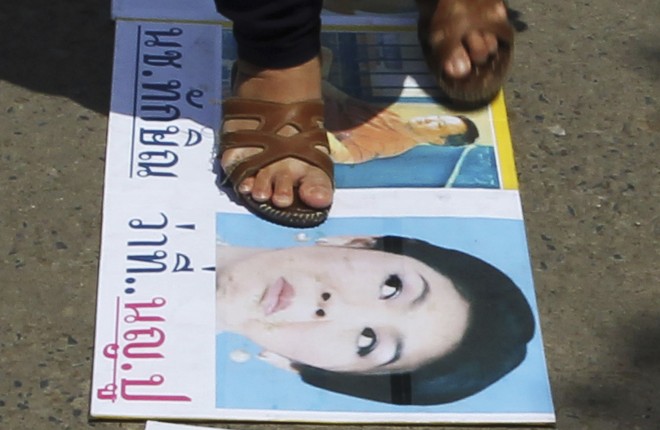Police fire tear gas at Thai protesters; 5 hurt

An anti-government protester steps on a poster with the photos of outsted Prime Ministers Thaksin Shinawatra, back, and Yingluck Shinawatra, front, during a rally at the compound of the National Broadcasting of Thailand (NBT) office Friday, May 9, 2014 in Bangkok, Thailand. Thai police fired tear gas and water cannons Friday to push back hundreds of protesters trying to force their way into a government compound, the latest indication that ousting the premier will not solve the country’s tense political crisis. AP
BANGKOK — Thai police fired tear gas and water cannons Friday to push back hundreds of protesters trying to force their way into a government compound, the latest indication that ousting the premier will not solve the country’s tense political crisis.
Five people were reported injured at the Center for the Administration of Peace and Order, the government’s security command center, where protesters tried to push down barbed wire-topped concrete barriers outside the compound.
The incident occurred as more than 10,000 protesters marched through the Thai capital to show that the ouster of Prime Minister Yingluck Shinawatra by a court earlier this week was not enough. A protest leader warned they will retaliate if their demands for the government’s complete removal were not met within three days.
Traffic was snarled around Bangkok as protesters marched to Government House — the prime minister’s main office — then Parliament, and surrounded several public television stations. They have called on TV stations to stop broadcasting government news and to air the protesters’ announcements.
“We won’t interrupt regular programming, but whenever we need to speak to people all over the country, we’d like to you to broadcast it live,” protest leader Suthep Thaugsuban told a cheering crowd.
Article continues after this advertisementFriday’s marches came two days after Yingluck was removed by the Constitutional Court on grounds that she had illegally transferred a civil servant to another post. Yingluck supporters and many analysts criticized the ruling as politically motivated.
Article continues after this advertisementThe ruling has emboldened anti-government protesters who are backed by the country’s urban elite and have staged six months of vociferous and sometimes violent demonstrations calling for Yingluck’s ouster.
Suthep demanded that the Supreme Court president, the Senate speaker and the Election Commission, along with other state agencies, jointly work to oust the current government.
“We want the change of government to be smooth. But if you cannot do it smoothly within three days, we the people will do it in our own way,” Suthep said.
Protesters want to install an appointed government to oversee reforms before new elections are held, a concept criticized by many as undemocratic. They oppose polls tentatively scheduled for July, which Yingluck’s allies would likely win.
The court rulings have angered Yingluck’s supporters, known as the Red Shirts, who have called for a huge rally Saturday to show support for the government, which won a landslide victory in 2011 elections.
The competing rallies will be a test of the country’s political volatility. They will be held several kilometers (miles) apart but have raised concerns of violence.
Thailand’s long-running political crisis began in 2006 when Yingluck’s brother, Thaksin Shinawatra, was ousted by a military coup after protests accused him of corruption, abuse of power and disrespect for King Bhumibol Adulyadej. Yingluck was criticized as Thaksin’s proxy and protesters say they want to remove all traces of the politically powerful Shinawatras from Thai politics.
“Hand power back to the people,” Suthep told a crowd at Bangkok’s Lumpini Park earlier in the day, when he called on protesters to keep the rally peaceful but also urged them to surround police cars. In the past, the protesters seized government offices, stormed television stations and cut electricity to several ministries.
More than 20 people have been killed and hundreds injured since November in sporadic gunbattles, drive-by shootings and grenade attacks.
Suthep called Friday’s rally a “final offensive,” a declaration mocked by some Thai media, which noted this was the 11th time in six months he has summoned supporters for a final protest.
After Wednesday’s ruling that removed Yingluck, the National Anti-Corruption Commission followed up Thursday by indicting her on charges of dereliction of duty for overseeing a widely criticized rice subsidy program.
That ruling means Yingluck will face an impeachment vote by the Senate, though it is not clear how Yingluck could be impeached from an office she no longer holds.
A consistent string of decisions by the courts and independent agencies such as the anti-graft commission against Yingluck and her political machine has eroded many people’s faith in the rule of law, raising the possibility of heightened civil unrest.
RELATED STORIES
Court dismisses Thai PM Yingluck Shinawatra from office
Thailand’s first female PM skewered by courts and family ties